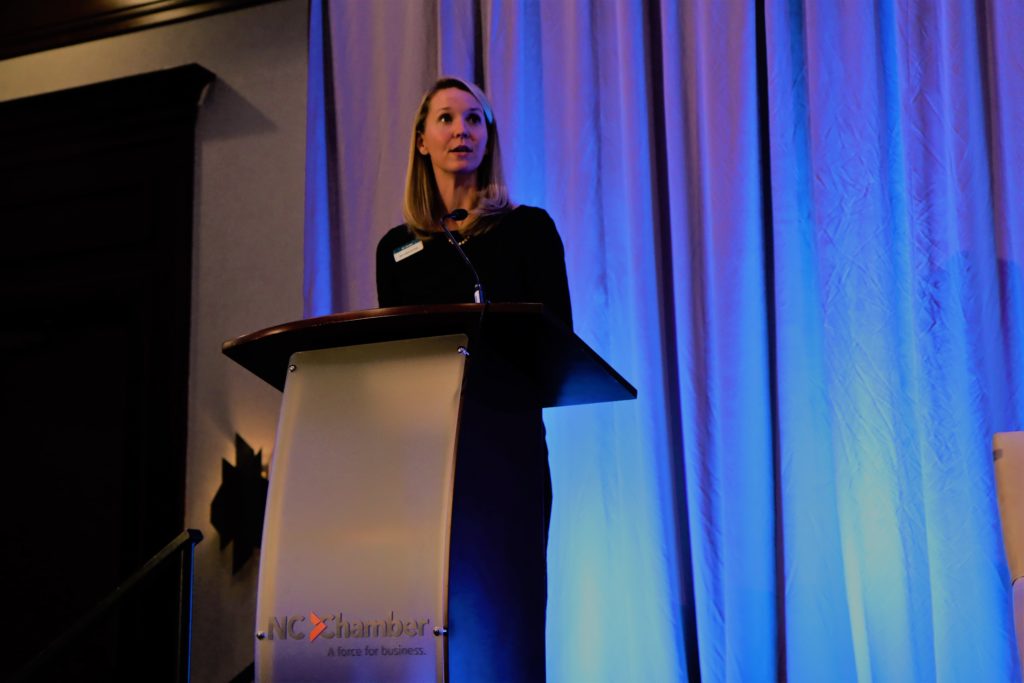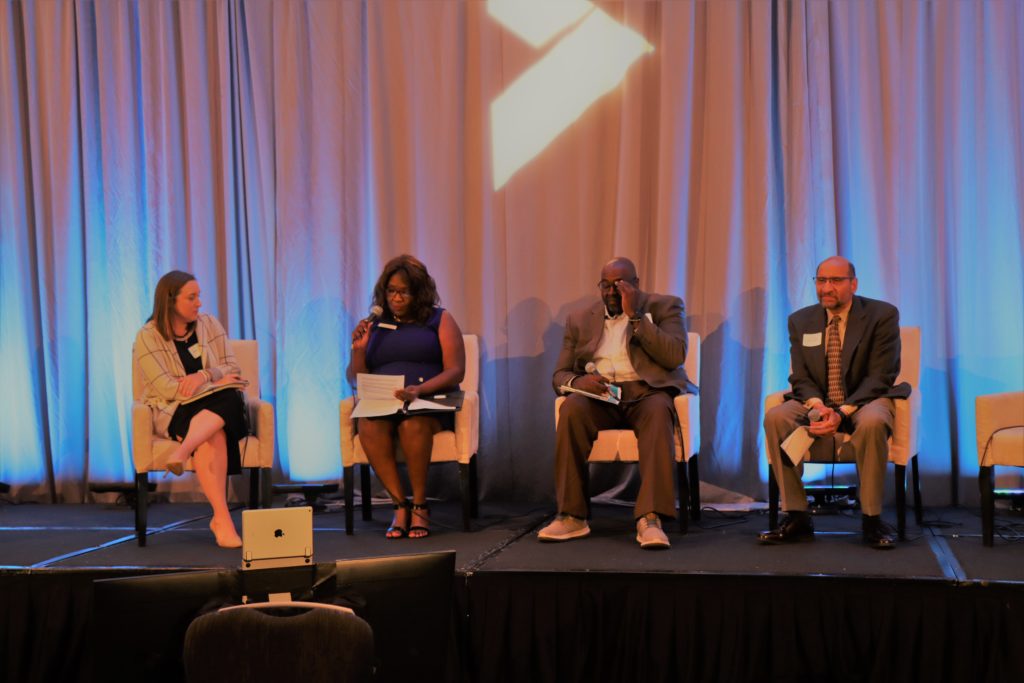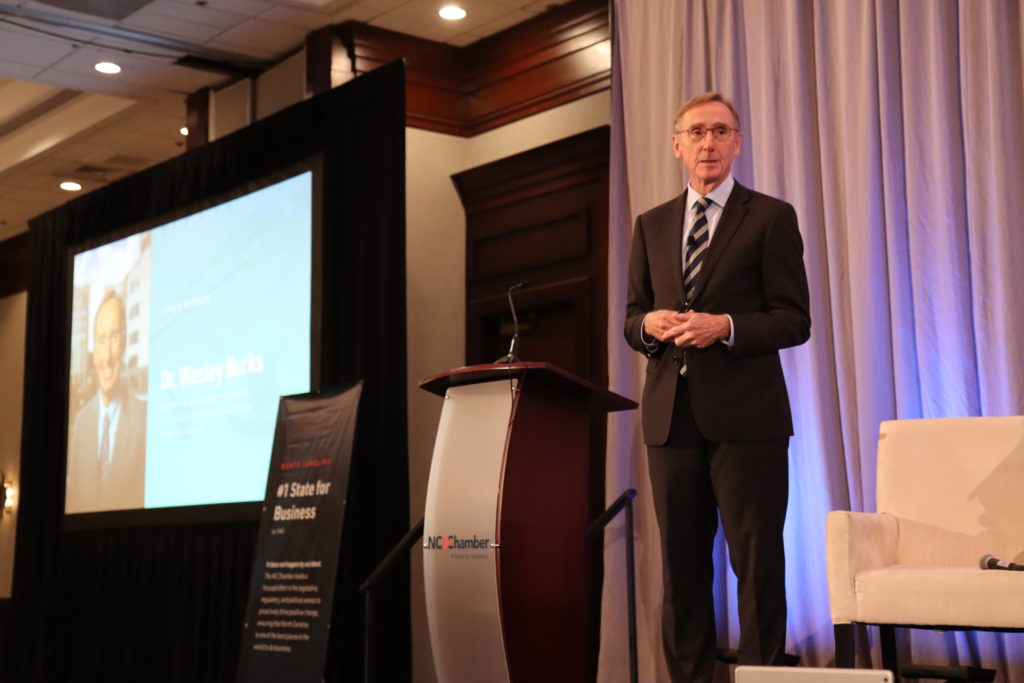NC Chamber Health Care Conference: Top Business & Health Care Leaders Discuss Most Pressing Health Issues for NC, Including Future Pandemic Preparedness

During last week’s Health Care Conference, NC Chamber Foundation President Meredith Archie gave opening remarks that helped set the stage for the themes of the day, which included driving innovation and cutting-edge research; addressing equitable access to quality care; ensuring a sustainable talent pipeline for some of our most critical jobs; and most importantly, how each of these factors can build on one another to make our community, and health care system more resilient.
She also focused on the longstanding impacts of the pandemic with a particular focus on the hardships for the health care industry. Additionally, she alluded to the work that the NC Chamber has been doing over the past year through its Strategic Initiative Board to address how the business community can help our state build resiliency and continuity beyond COVID.
As Archie stated in her speech, “While we know there will be lasting changes, it is incumbent upon all of us, as leaders, to ensure we are better prepared for the next major crisis.”
Building on that concept, was another morning session titled, “Pandemic Preparedness for the Future,” which was paneled by NC Chamber’s President and CEO Gary Salamido and the NC Institute of Medicine’s (NCIOM’s) President and CEO Kathleen Colville.
Both panelists discussed the unforeseen impacts on education and health equity as examples, and how both the NC Chamber and NCIOM have completed pandemic reports to address future issues of a similar caliber.
During the discussion, Colville stated, “We cannot move forward thinking this isn’t going to happen again right as we’re coming back into ‘blue sky’ territory.”
Health Equity: The Business Community’s Role in Building a Healthy NC
During this session, Dr. John Lumpkin, who is vice president of the Drivers of Health Strategy at Blue Cross NC, began the conversation speaking about how life expectancies vary greatly depending on one’s community, even one that is just five miles away. In his role at Blue Cross, he said it’s their mission to not rest until health care is better for all.
William Buster, CEO and President of the New Hanover Community Endowment piggybacked off those comments and talked about the regional inequities that exist particularly in the most rural parts of the state, such as Western, North Carolina. He discussed how a lack of infrastructure, food insecurity, childcare issues, and lack of basic transportation in those communities, as well as lack of convenience, lends itself inequities and access to care problems.
When asked about how we improve access to care and advice to employers on how to ensure adequate access, Dr. Lumpkin admitted that was not an easy question to answer but that Blue Cross has been making strides to identify trends across our state and thus far has visited nearly half of the NC’s counties. He stated that every county has an oral health shortage, 94 counties have a behavioral health shortage, and 60 counties have no psychiatrist. Among Blue Cross’s current goals with health inequities include, improving maternal health outcomes by 50% within four years and reducing challenges that people face in accessing behavioral health services by 25%.
Lumpkin said, “Access to health is not the beginning of the problem. It’s the end of the road. Many of the issues that have been already discussed are what lead people to show up in the emergency department. We must think about those factors in the community that make a difference in health outcomes and address the existing disparities in those communities.”

On the topic of moving the needle with gaps in telehealth and infrastructure solutions, panelist Iris Phillips, CEO and Founder of Grace Federal Solutions, said that we saw great improvements as a matter of necessity during the pandemic. However, she noted the importance of access to broadband and ensuring that populations such as the elderly have access to phones.
She stated, “While we’re in the midst of improving telehealth, we also have to improve the infrastructure—the technology—that makes that happen.”
Panelists also discussed the cost of care as a major obstacle to many, beyond those experiencing health disparities. Dr. Lumpkin discussed Blue Cross NC’s commitment to make health care more affordable from the insurer side of the health care equation.
In closing he said,” We cannot meet health care quality goals until we address health inequities.” He talked about how food insecurity for example is a major problem that leads to lower productivity and mental performance, stating that this is “not just a health issue but a business issue.”
William Buster shared a similar sentiment saying, “Disparities make all health care outcome numbers go down. We must go to the regions where disparities are the highest.”
Workforce Challenges in Health Care Today
While labor shortages have been prevalent across all industry sectors, the health care industry has been hit particularly hit hard by extensive worker burnout, the Great Resignation, and those retiring at record rates.
According to those who presented in this session, the most common vacancies we’re seeing include nurses, medical assistants, behavioral health workers, environmental services, office staff, and physicians/surgeons/dentists. The reasons for these vacancies included: COVID exacerbating pre-existing shortages, an inability to compete with travel agencies for wages, not being able to compete with other business sectors (wages, work conditions, etc.), and too few applicants.
Session panelist Hugh Tilson of NC AHEC touted the benefits of utilizing the NC Chamber’s Talent Pipeline Management (TPM) program as one tangible way to help solve for the pervasive talent supply shortage being seen in this sector.
Closing Session: Health Care on the Horizon
In the closing session with Dr. Wesley Burks, Dean of the UNC School of Medicine, he spoke more about health care shortages and the impact of the nursing shortage of patient care when it was at an all-time high of 25%. As was mentioned in a previous session, health care salaries were a major reason contributing to the worker shortage. Dr. Burks discussed the health system’s recent investment of $25 million into increasing nursing salaries and allocating $30 million toward worker bonuses among those who made it through at least part of the pandemic surge. He also explained how they want to be a destination workplace and have looked to revamp their overall benefits including parental leave policies. Additionally, Dr. Burks discussed innovative solutions that the health care system has undertaken including using technology to provide acute care to patients in their homes.
Toward the end of his remarks, he commented on the importance of listening in those communities with the highest distrust of health care, saying “We need to stop making assumptions about what these communities want, which is going to look different from community to community. We also need to make sure that our front-line teams, our leadership teams, and our boards reflect the communities that we serve. Otherwise, you are missing important perspectives and it is very likely that your perspective is incomplete. And so, we want to make sure we have representation of those communities at those decision-making tables.”

All photos from the conference can be found at this link.